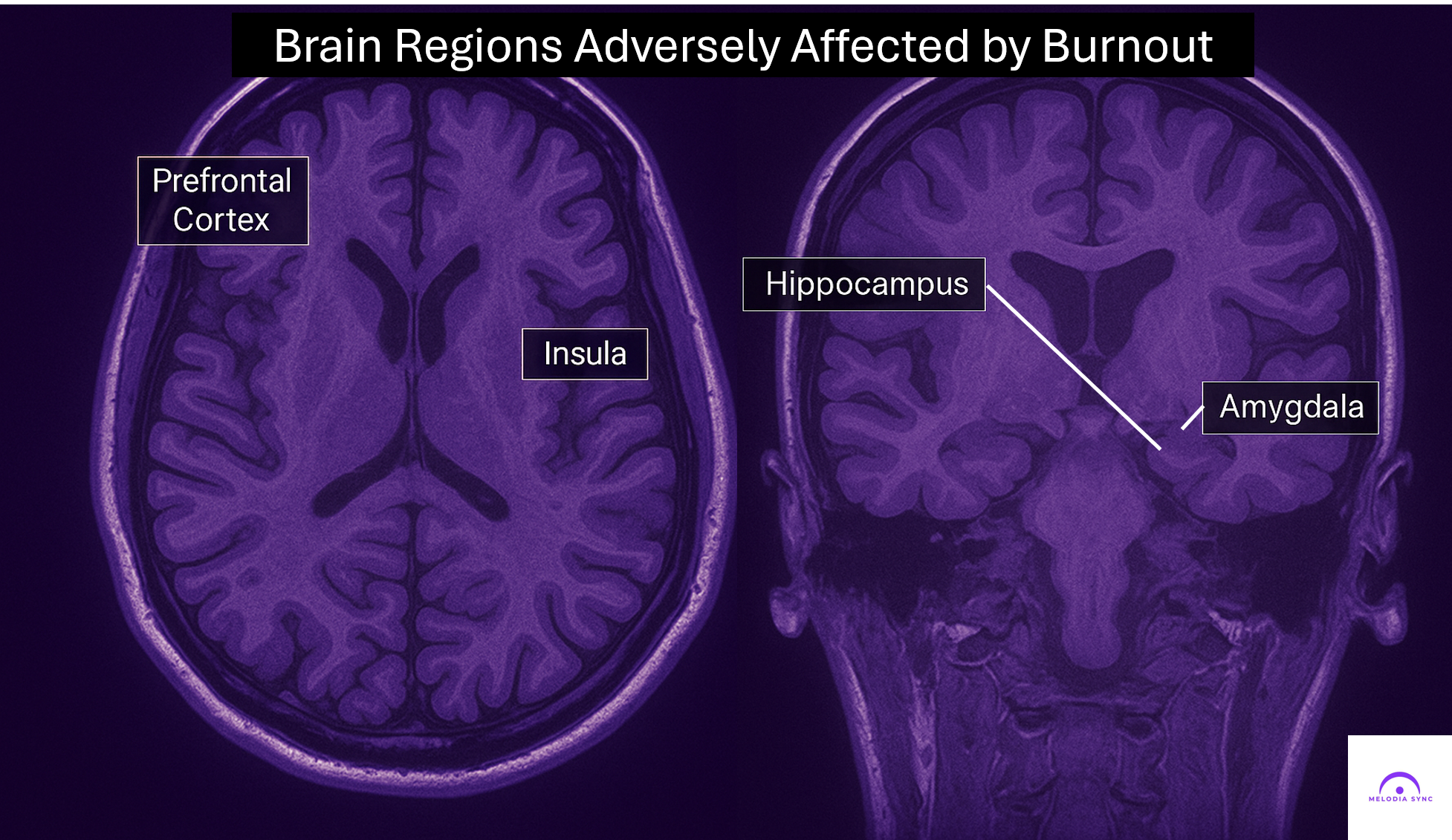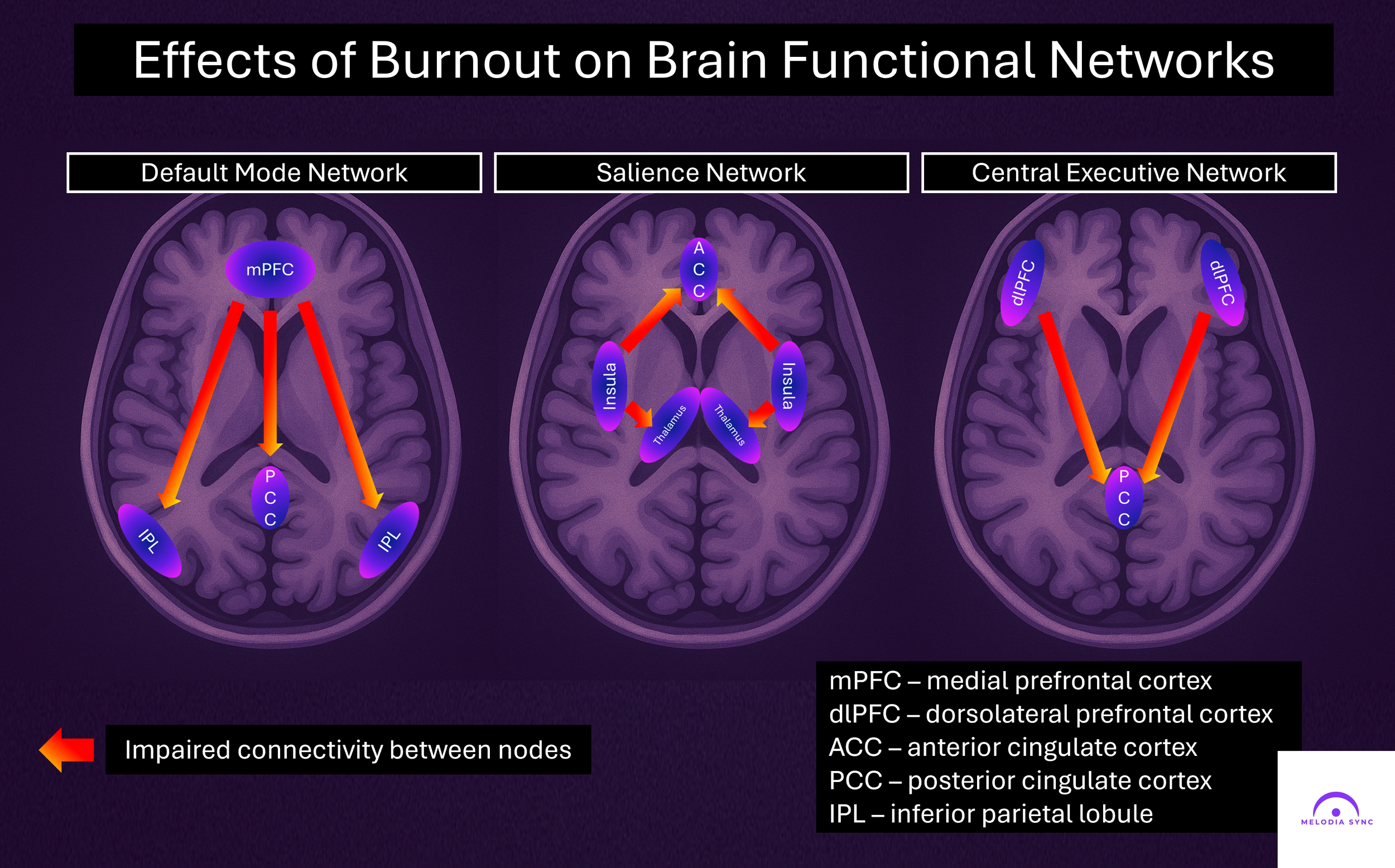Can Burnout Shrink Your Brain?
When we talk about burnout, we usually think about stress, exhaustion, and maybe losing motivation. But here’s something you may not know: burnout doesn’t just feel like it’s all in your head – it actually changes the structure and function of your brain.
But there’s good news, too! These changes are not necessarily permanent. Your brain is resilient. With the right steps, healing is possible.
In this article, we will explore how burnout affects your brain, what recent neuroimaging studies show, and how to begin the process of rebuilding mental clarity and strength.
What Is Actually Happening in a Burned-Out Brain?
Let’s begin with a question: if someone scanned your brain during a period of high stress or burnout, what would they see?
Neuroscientists have used MRI and fMRI to do just that. And their findings are as fascinating as they are alarming.
Here's what the brain scans reveal:
Reduced gray matter volume in areas tied to emotion, decision-making, and memory
Weakened connections between brain regions responsible for focus and regulation
Disrupted communication networks, especially in visual and memory systems
Longer path lengths and less efficient brain signaling across regions
Let’s break this down in plain English.
The Brain Under Burnout
Your brain is like a city. Each region has a job, and information travels between them via highways (neural pathways). When things run smoothly, it is efficient and productive.
But burnout is like a traffic jam that won’t clear up. The highways are overloaded. Detours form. Some neighborhoods stop communicating altogether.
Key areas impacted:
Prefrontal Cortex: Often called the brain’s “CEO,” it handles planning, focus, and impulse control. Under chronic stress, it actually starts to shrink, making decision-making and concentration harder.
Hippocampus: This memory hub helps store and recall information. Studies show it can lose volume under prolonged stress, affecting short- and long-term memory.
Amygdala: Your emotional alarm system. Burnout ramps up its activity, keeping you in a loop of hyper-alertness, anxiety, or emotional fatigue.
Insula & Thalamus: These regions help you process sensory input and emotional signals. Burnout has been shown to disrupt their structure and communication patterns.
So, when you’re forgetful, foggy, or emotionally “flat,” it’s not just your imagination, but a result of real, physical changes in the brain.
How Neuroimaging Tells the Story
One 2022 study looked at nurses experiencing severe burnout. Using resting-state fMRI, the researchers discovered:
Reduced efficiency in the brain’s overall network
Decreased connectivity between the visual network and right hippocampus (affecting memory and attention)
Increased path length (meaning information takes longer to travel between areas)
Another study found that people with high emotional exhaustion had less gray matter in their ventromedial prefrontal cortex—the very region involved in empathy, self-awareness, and emotional control.
Even more striking: participants with higher burnout scores showed altered network topology, meaning the brain’s entire communication map was disrupted.
In short, burnout makes your brain less connected, slower to respond, and less able to manage thoughts or emotions.
What This Means for Your Day-to-Day Life
Okay, science aside, what does all this mean for you?
It explains why burnout feels like:
You’re mentally slower than usual
You struggle to make decisions, even simple ones
Your memory is unreliable—forgetting tasks, names, or appointments
Multitasking becomes nearly impossible
Emotions feel muted or overwhelming, with no in-between
These aren’t personality flaws or “just stress.” They are signs that your brain is struggling to function in a healthy, connected way.
Imagine this:
You're a lawyer prepping for a high-stakes case. You used to breeze through your outlines. But now, you're rereading documents, forgetting key arguments, and snapping at coworkers. You're exhausted—but even on days when you sleep more, your brain doesn’t “wake up.”
That’s burnout. Burnout is working behind the scenes in your neural wiring.
Burnout vs. Depression: What’s the Difference?
While both can impact the brain, burnout and depression are not the same.
Burnout is a response to chronic work-related stress and overload.
Depression is a broader mental health condition that may include low mood, loss of interest, and changes in sleep and appetite, with many causes (biological, social, psychological).
Interestingly, the brain changes in burnout are unique, with distinct patterns in functional connectivity – particularly between emotion and memory areas.
Still, the two can overlap. That’s why early recognition of burnout is so important, to stop it from snowballing into something more serious.
The Good News: Your Brain Can Heal
Here’s the most hopeful part of the story: these changes are not permanent.
Thanks to neuroplasticity, the brain can form new connections, strengthen weak ones, and recover from structural changes caused by stress.
Studies show that recovery includes:
Improved gray matter in regions impacted by stress
Restored connectivity across brain networks
Rebalanced activity between emotional and logical centers
But healing doesn’t happen automatically. It requires rest, support, and tools that help guide your brain out of chronic stress mode.
How to Support a Burned-Out Brain
If your brain feels like it’s “not working like it used to,” here are science-backed ways to support healing:
1. Prioritize Deep, Quality Sleep
Sleep is when your brain clears out toxins, processes emotions, and stores memories. Burnout often ruins sleep—but sleep is your brain’s best repair tool.
Tip: Aim for 7–9 hours per night and limit screens at least 1 hour before bed.
2. Move Your Body
Exercise boosts blood flow to the brain and increases brain-derived neurotrophic factor (BDNF) – a protein that supports neuron growth.
Tip: Even 20 minutes of brisk walking 3–5 times a week can help.
3. Practice Mindfulness and Breathing
Mindfulness lowers amygdala reactivity and strengthens the prefrontal cortex, helping regulate stress and improve attention.
Tip: Try 5 minutes of box breathing: Inhale-4, Hold-4, Exhale-4, Hold-4.
4. Reengage in Joyful, Low-Stress Activities
Hobbies and creative outlets aren’t “extras” – they are cognitive nourishment. They reintroduce novelty, pleasure, and relaxation.
Tip: Gardening, drawing, journaling, or listening to calming music all count.
5. Use Targeted Brain Support Tools
New technologies, including EEG-guided neurofeedback, offer a direct way to support the brain’s return to balance.
How MelodiaSync Helps Restore Brain Connectivity
At MelodiaSync, we combine real-time EEG monitoring using a simple wearable EEG headset with personalized binaural beats to help your brain:
Regain focus and clarity
Reduce emotional overload
Restore healthy neural connectivity
Recover from the effects of long-term stress
We’re not just about relaxation, we’re about results. Our technology is built on the understanding that the brain, when guided correctly, knows how to heal itself.
Whether you're navigating workplace burnout, recovering from high-stress trauma, or just trying to regain mental sharpness, MelodiaSync is here to support your journey.
Ready to Claim Your Brain Back?
Burnout can shrink your brain—but it doesn’t have to shrink your life.
By understanding what’s really going on beneath the surface, you can make informed, compassionate choices that support your recovery.
Let go of the shame, the pressure to “push through,” and the belief that forgetting or slowing down is a personal failure – it is certainly not.
It’s biology and some biological processes can be reversed with the right actions and tools.
Interested in Learning More about How EEG-guided Binaural Beats Can Help You Recover from Burnout:
Explore how MelodiaSync works
Sign up to become an early-access beta tester
Subscribe to our science-backed brain wellness newsletter
Disclaimer: This blog post is intended for informational purposes only and does not constitute medical advice. Please consult with a qualified healthcare professional for any health concerns or before making any decisions related to your health or treatment.



